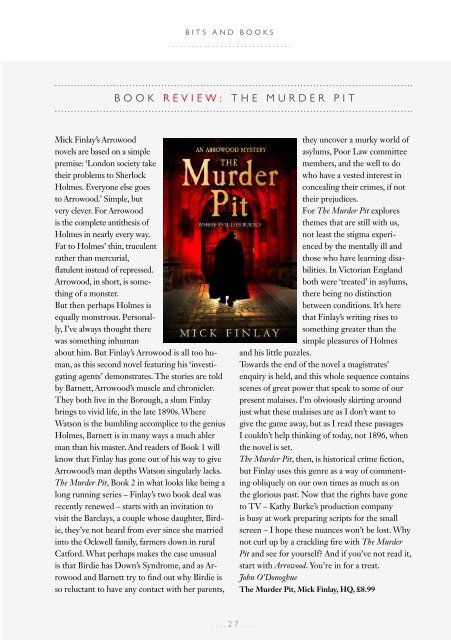Viva Brighton Issue #71 January 2019
- No tags were found...
You also want an ePaper? Increase the reach of your titles
YUMPU automatically turns print PDFs into web optimized ePapers that Google loves.
BITS AND BOOKS<br />
...............................<br />
BOOK REVIEW: THE MURDER PIT<br />
Mick Finlay’s Arrowood<br />
novels are based on a simple<br />
premise: ‘London society take<br />
their problems to Sherlock<br />
Holmes. Everyone else goes<br />
to Arrowood.’ Simple, but<br />
very clever. For Arrowood<br />
is the complete antithesis of<br />
Holmes in nearly every way.<br />
Fat to Holmes’ thin, truculent<br />
rather than mercurial,<br />
flatulent instead of repressed.<br />
Arrowood, in short, is something<br />
of a monster.<br />
But then perhaps Holmes is<br />
equally monstrous. Personally,<br />
I’ve always thought there<br />
was something inhuman<br />
about him. But Finlay’s Arrowood is all too human,<br />
as this second novel featuring his ‘investigating<br />
agents’ demonstrates. The stories are told<br />
by Barnett, Arrowood’s muscle and chronicler.<br />
They both live in the Borough, a slum Finlay<br />
brings to vivid life, in the late 1890s. Where<br />
Watson is the bumbling accomplice to the genius<br />
Holmes, Barnett is in many ways a much abler<br />
man than his master. And readers of Book 1 will<br />
know that Finlay has gone out of his way to give<br />
Arrowood’s man depths Watson singularly lacks.<br />
The Murder Pit, Book 2 in what looks like being a<br />
long running series – Finlay’s two book deal was<br />
recently renewed – starts with an invitation to<br />
visit the Barclays, a couple whose daughter, Birdie,<br />
they’ve not heard from ever since she married<br />
into the Ockwell family, farmers down in rural<br />
Catford. What perhaps makes the case unusual<br />
is that Birdie has Down’s Syndrome, and as Arrowood<br />
and Barnett try to find out why Birdie is<br />
so reluctant to have any contact with her parents,<br />
they uncover a murky world of<br />
asylums, Poor Law committee<br />
members, and the well to do<br />
who have a vested interest in<br />
concealing their crimes, if not<br />
their prejudices.<br />
For The Murder Pit explores<br />
themes that are still with us,<br />
not least the stigma experienced<br />
by the mentally ill and<br />
those who have learning disabilities.<br />
In Victorian England<br />
both were ‘treated’ in asylums,<br />
there being no distinction<br />
between conditions. It’s here<br />
that Finlay’s writing rises to<br />
something greater than the<br />
simple pleasures of Holmes<br />
and his little puzzles.<br />
Towards the end of the novel a magistrates’<br />
enquiry is held, and this whole sequence contains<br />
scenes of great power that speak to some of our<br />
present malaises. I’m obviously skirting around<br />
just what these malaises are as I don’t want to<br />
give the game away, but as I read these passages<br />
I couldn’t help thinking of today, not 1896, when<br />
the novel is set.<br />
The Murder Pit, then, is historical crime fiction,<br />
but Finlay uses this genre as a way of commenting<br />
obliquely on our own times as much as on<br />
the glorious past. Now that the rights have gone<br />
to TV – Kathy Burke’s production company<br />
is busy at work preparing scripts for the small<br />
screen – I hope these nuances won’t be lost. Why<br />
not curl up by a crackling fire with The Murder<br />
Pit and see for yourself? And if you’ve not read it,<br />
start with Arrowood. You’re in for a treat.<br />
John O’Donoghue<br />
The Murder Pit, Mick Finlay, HQ, £8.99<br />
....27....


















